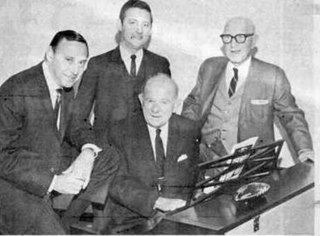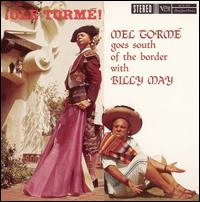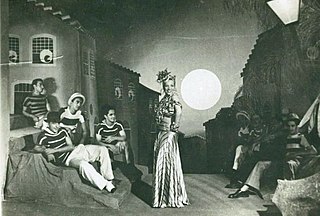Mambo is a genre of Cuban dance music pioneered by the charanga Arcaño y sus Maravillas in the late 1930s and later popularized in the big band style by Pérez Prado. It originated as a syncopated form of the danzón, known as danzón-mambo, with a final, improvised section, which incorporated the guajeos typical of son cubano. These guajeos became the essence of the genre when it was played by big bands, which did not perform the traditional sections of the danzón and instead leaned towards swing and jazz. By the late 1940s and early 1950s, mambo had become a "dance craze" in the United States as its associated dance took over the East Coast thanks to Pérez Prado, Tito Puente, Tito Rodríguez and others. In the mid-1950s, a slower ballroom style, also derived from the danzón, cha-cha-cha, replaced mambo as the most popular dance genre in North America. Nonetheless, mambo continued to enjoy some degree of popularity into the 1960s and new derivative styles appeared, such as dengue; by the 1970s it had been largely incorporated into salsa.

Cole Albert Porter was an American composer and songwriter. Many of his songs became standards noted for their witty, urbane lyrics, and many of his scores found success on Broadway and in film.

Fred Astaire was an American dancer, singer, actor, choreographer, and television presenter. He is widely considered the most influential dancer in the history of film.

Louis Wolfe Gilbert was a Russian Empire-born American songwriter of Tin Pan Alley.

Broadway Melody of 1940 is a 1940 MGM film musical starring Fred Astaire, Eleanor Powell and George Murphy. It was directed by Norman Taurog and features music by Cole Porter, including "Begin the Beguine".
"You're the Top" is a Cole Porter song from the 1934 musical Anything Goes. It is about a man and a woman who take turns complimenting each other. The best-selling version was Paul Whiteman's Victor single, which made the top five.

"Let's Do It, Let's Fall in Love" is a popular song written in 1928 by Cole Porter. It was introduced in Porter's first Broadway success, the musical Paris (1928) by French chanteuse Irène Bordoni for whom Porter had written the musical as a starring vehicle.

Hermes Pan was an American dancer and choreographer, principally remembered as Fred Astaire's choreographic collaborator on the famous 1930s movie musicals starring Astaire and Ginger Rogers. He worked on nearly two dozen films and TV shows with Astaire. He won both an Oscar and an Emmy for his dance direction.

You'll Never Get Rich is a 1941 Hollywood musical comedy film with a wartime theme directed by Sidney Lanfield and starring Fred Astaire, Rita Hayworth, Robert Benchley, Cliff Nazarro, with music and lyrics by Cole Porter. The title stems from an old Army song which includes lyrics "You'll never get rich / by digging a ditch / you're in the Army now!"

You Were Never Lovelier is a 1942 American musical romantic comedy film directed by William A. Seiter and starring Fred Astaire and Rita Hayworth. It also features Adolphe Menjou and Xavier Cugat. The music was composed by Jerome Kern and the lyrics by Johnny Mercer. It was released by Columbia Pictures.
"A Fine Romance" is a popular song composed by Jerome Kern with lyrics by Dorothy Fields, published in 1936.
Gustavo Pérez Firmat was born in 1949, Havana, Cuba, and raised in Miami, Florida. He attended Miami-Dade Community College, the University of Miami, and the University of Michigan, where he earned a Ph.D. in Comparative Literature. He taught at Duke University from 1979 to 1999 and is the David Feinson Professor in the Humanities at Columbia University. He serves on the editorial advisory board of Chiricú.

¡Olé Tormé!: Mel Tormé Goes South of the Border with Billy May is a 1959 studio album by Mel Tormé, arranged by Billy May. It was one of many Latin-tinged jazz albums released in the late 1950s and early 1960s.
Rumba is a secular genre of Cuban music involving dance, percussion, and song. It originated in the northern regions of Cuba, mainly in urban Havana and Matanzas, during the late 19th century. It is based on African music and dance traditions, namely Abakuá and yuka, as well as the Spanish-based coros de clave. According to Argeliers León, rumba is one of the major "genre complexes" of Cuban music, and the term rumba complex is now commonly used by musicologists. This complex encompasses the three traditional forms of rumba, as well as their contemporary derivatives and other minor styles.
"I'm Old Fashioned" is a 1942 song composed by Jerome Kern, with lyrics written by Johnny Mercer.
"Dream Dancing" is a song written by Cole Porter for the 1941 film You'll Never Get Rich, where it was introduced as an instrumental. The first recording was made by Fred Astaire with Harry Sosnik and his Orchestra and The Delta Rhythm Boys in 1941 under the Decca label (#18188).
"Pick Yourself Up" is a popular song composed in 1936 by Jerome Kern, with lyrics by Dorothy Fields. It has a verse and chorus, as well as a third section, though the third section is often omitted in recordings. Like most popular songs of the era it features a 32 bar chorus, though with an extended coda.

Miguelito Valdés, also known as Mr. Babalú, was a renowned Cuban singer. His performances were characterized by a strong voice and a particular sense of cubanismo.
Helen Hunt was a hair stylist in Hollywood movies from the 1930s up to 1967, when she worked on Guess Who's Coming to Dinner. She was the chief hair stylist for Columbia Pictures.

O que é que a baiana tem? is a song composed by Dorival Caymmi in 1939 and recorded by Carmen Miranda.










